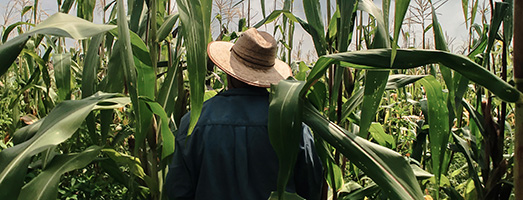Since the turn of the twentieth century, crop science has pushed agricultural productivity to unprecedented levels, while expanding production frontiers worldwide. These achievements have been widely celebrated for averting famine and sustaining economic development even as global population expanded dramatically.

However, a dominant narrative of science-driven agricultural growth over this period has at times obscured the persistence of hunger, emergence of environmental problems, and contributions of scientific research and technological interventions to inequality despite the best intentions of those working in crop science and related fields. Historical accounts of agricultural change have been crucial in forging new understandings of the (uneven) contributions of crop science to sustaining human communities and cultures at local, regional, and global scales.
This special issue of Plants, People, Planet will bring new voices and perspectives to the ongoing project of understanding the history of agricultural science and development, with the goal of better informing research and policy of the present and future.
Contributions will offer historically informed accounts that chart how and with what consequences various kinds of knowledge, labour, techniques and tools within crop science and allied fields were used to advance agricultural production in specific times and places. They will reflect especially on how historical perspectives help us to understand the relationships among crop science, environmental change, food security and, ultimately, human well-being.
In bringing together geographically diverse and historically rich perspectives, the special issue will seek to offer new insights into the changing role of plant scientists and other researchers in shaping the conservation, utilization and cultivation of diverse crop varieties and communities’ experiences of food security and sovereignty – during a period in which scientists aimed to address these as increasingly pressing, and increasingly global, concerns.
We welcome contributions that adopt historical methods and materials to explore the development of crop science and allied fields in the period since 1900 and assess the contributions of crop science knowledge, labour, tools or techniques to social, agricultural, or environmental change in particular times and places. We are particularly interested in archive-based case studies and studies that highlight the voices and contributions of figures marginalised or missing in existing studies.
Contributions may include (but are not limited to) historical accounts of:
The knowledge, labour, tool and/or techniques imagined or used as means of creating or disseminating new crop varieties
The development of specific commodities or crop varieties
The development of particular institutions or programmes for crop science
The role of the state, economy and society in shaping research programmes
The effect of conflict or (post)colonial conditions on crop selection and production
Please submit your manuscript by 31 March 2023. Contact the Editorial Office if you have any questions, or a potential manuscript that you would like to discuss.
With best wishes,
Helen Anne Curry and Ryan Nehring

Guidelines
Plants, People, Planet, published by the not-for-profit New Phytologist Foundation, is an Open Access journal that aims to celebrate everything new, innovative and exciting in plant-focused research that is relevant to society and people’s daily lives.
Manuscripts submitted for consideration in Plants, People, Planet will be subject to peer review and must meet the aims and scope of the journal. Articles should include an engaging 100-word Societal Impact Statement to highlight why the work matters to people, society and the planet, and to outline any implication of the work for policy or practice.
We can publish alternative language versions of the Societal Impact Statement to enhance the reach and impact of your work. Please include any translated versions of this text, when submitting your work. Please see an example of an alternative language Societal Impact Statement in English, French and Spanish.
Please note, Wiley has arrangements to cover the publication fee for authors based in certain institutions or regions, and there are some waivers and discounts available for special issue authors who lack funds and are not covered by one of these two routes. We do not want lack of funds to be a barrier to contributing to the special issue, so if you have a great article idea, please get in touch and we can discuss options to support you.
Please refer to the full Author Guidelines before submission, which contain information on article types and format, as well as details on how to compile the electronic version of your manuscript. Please contact us if you have questions or a potential manuscript that you would like to discuss.
Submission procedure
Please click the button below to submit your manuscript on ScholarOne Manuscripts (opens in a new tab).
Parts of this page may have been imported from a previous website. If you spot any errors on this page please contact us using the link below.
